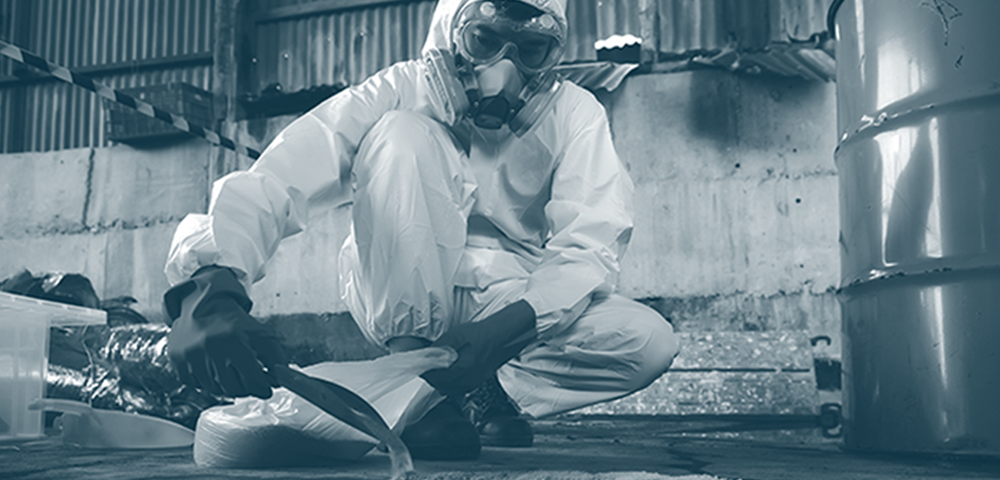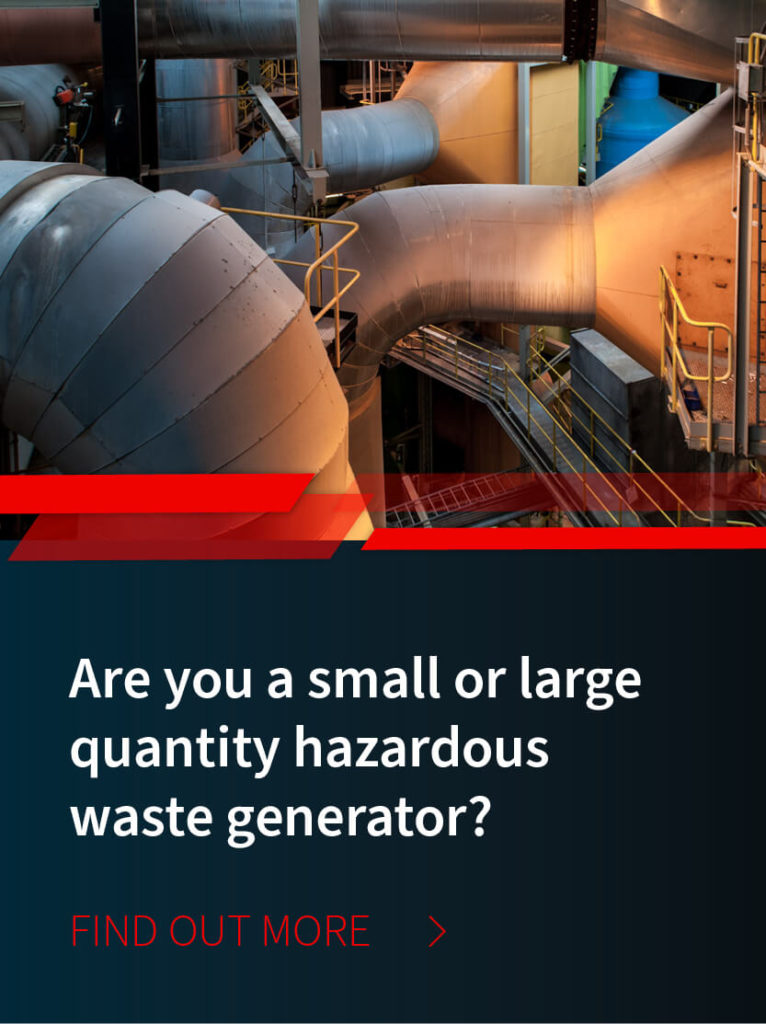
/ IN THIS BLOG
RCRA Georgia requirements don’t have to keep you up at night. If you own or manage a business in Georgia, hazardous waste regulations might not be at the top of your daily to-do list, but they might be a nagging source of stress. Many business leaders worry because they aren’t sure if they’re up-to-date on the latest changes or acting in a fully compliant manner. There’s good reason to stress.
Ignoring Georgia hazardous waste regulations can be a costly mistake. Many small and mid-sized businesses generate hazardous waste without realizing it. Solvents, paint thinners, cleaning chemicals, used oils, batteries, and more can all trigger legal requirements under federal and state law.
The Resource Conservation and Recovery Act (RCRA) affects how Georgia businesses must handle, store, document, and dispose of hazardous waste. And in 2025, important updates are in play. You probably already are well aware that hazardous waste regulations aren’t static. Their continuous evolution makes them particularly challenging. Keeping up with new requirements isn’t easy if it’s not your core business. But to start, it helps to briefly understand what RCRA Georgia requirements you need to follow. This will move you on the right path to remaining compliant for years to come. If your company is based anywhere in the state of Georgia, here’s what you need to know to stay protected.
01 / What Is RCRA?
The Resource Conservation and Recovery Act (RCRA) is the main federal law governing the proper management of hazardous and non-hazardous solid waste. It was passed in 1976 to ensure that hazardous waste is safely handled. This includes from the time the waste is created to the moment it’s properly treated or disposed of.
RCRA gives the U.S. Environmental Protection Agency (EPA) the authority to oversee hazardous waste across the country. But the system is designed to work in partnership with state agencies. In Georgia, the EPA has authorized the Georgia Environmental Protection Division (EPD) to manage the state’s hazardous waste program.
That means if you’re running a business in Georgia, you are subject to RCRA requirements as implemented by Georgia EPD. Even if you generate small amounts of waste, or if you operate in an industry that doesn’t traditionally think of itself as hazardous, RCRA may still apply to you.
02 / How Does RCRA Apply in Georgia?
While RCRA is a federal law, Georgia operates its own hazardous waste program through the Georgia Environmental Protection Division (EPD). Georgia’s program must at the bare minimum meet the federal standards set by the EPA. In many areas, however, requirements may exceed the RCRA rules and include additional state-specific requirements and deadlines.
The Georgia EPD enforces hazardous waste regulations across the state. This includes overseeing how businesses classify waste, how long they can store it on site, and how it must be transported and documented. Even if your company isn’t a major industrial facility, you can still fall under these rules. Businesses as diverse as auto shops, construction firms, printers, metal fabricators, and manufacturers (just to name a few) all routinely generate waste that qualifies as hazardous under Georgia hazardous waste regulations.
In 2025, the state is placing particular emphasis on helping businesses transition to the EPA’s new e-Manifest system for hazardous waste shipments. Georgia EPD also requires Small Quantity Generators (SQGs) to re-notify the agency about their generator status, adding another key reporting requirement this year.
Keeping up with both federal and Georgia-specific rules is essential. Working with a trusted waste management partner can help simplify compliance and give your business peace of mind.
03 / Understanding Generator Categories
One of the first steps in complying with RCRA is understanding your company’s generator category. This determines what regulations apply to you and what actions you must take to remain in compliance.
Businesses that produce hazardous waste are classified into three main categories based on the amount they generate in a calendar month:
Large Quantity Generator (LQG):
These businesses generate 1,000 kg (about 2,200 lbs) or more of hazardous waste per month, or more than 1 kg of acutely hazardous waste. LQGs face the most stringent requirements, including full e-Manifest participation, biennial reporting, contingency planning, employee training, and strict storage limits.
Small Quantity Generator (SQG):
If your business generates between 100 kg and 1,000 kg (about 220 to 2,200 lbs) of hazardous waste per month, you’re an SQG. With this designation, as of 2025, you must also participate in e-Manifest and must re-notify the Georgia EPD of your status by September 1, 2025, if you haven’t done so within the past four years.
Very Small Quantity Generator (VSQG):
Generators of less than 100 kg (about 220 lbs) of hazardous waste per month. VSQGs have fewer reporting requirements but still need to ensure proper waste handling and disposal.
Determining your generator category isn’t always obvious, especially if your business generates waste in batches or through varied processes. It’s important to review your operations carefully to avoid misclassification, which can lead to violations.
04 / Georgia e-Manifest Requirements
In 2025, Georgia businesses that generate hazardous waste face a major regulatory shift with the required transition to the EPA’s electronic manifest, or e-Manifest, system. This system replaces traditional paper-based tracking with a centralized digital platform that monitors hazardous waste shipments from origin to destination.
Starting in January of 2025, Large Quantity Generators (LQGs) and Small Quantity Generators (SQGs) in Georgia are now required to register for the e-Manifest system through the EPA’s RCRA Info portal. Without registration, generators will not be able to access the final signed manifest for their shipments, which is a key compliance requirement.
Here’s what LQG and SQG Georgia businesses need to do:
Register in RCRA Info and set up an account with both Site Management and e-Manifest Certifier permissions.
Assign at least two Site Managers, who can manage other user roles.
Use e-Manifest for all hazardous waste shipments—paper copies will no longer be mailed by receiving facilities.
Penalties for non-compliance can be severe. If in doubt, seek professional help such as that provided by MCF Environmental Services. We’ll make sure you’re filling out manifests and bills of lading correctly. Protect your employees, the environment, and the general public
Alongside the e-Manifest transition, Georgia EPD requires SQGs to re-notify the agency of their generator status by September 1, 2025, if they haven’t done so in the past four years. This ensures that Georgia’s records are up to date as the state aligns with national tracking systems.
The transition to e-Manifest is a clear example of how hazardous waste regulations evolve. Georgia e-Manifest requirements are just one piece of the waste compliance puzzle. Businesses that stay current and connected will have a much smoother experience adapting to these ongoing changes. One of the easiest ways is to partner with a reliable waste management partner, whose job it is to stay on top of the latest changes and act accordingly.
05 / The Risks of Noncompliance
Failing to comply with hazardous waste regulations can put your business at serious risk. Many Georgia companies mistakenly assume that if they only generate small amounts of waste, they’re not subject to RCRA, or that minor oversights won’t trigger penalties. Unfortunately, neither is true.
One of the most important concepts to understand is cradle-to-grave liability. As the generator of hazardous waste, your company remains legally responsible for it from the moment it’s created until it is properly treated or disposed of, even after it leaves your facility. If waste is mismanaged at any point, you may be held liable.
Penalties for noncompliance can include steep fines, cleanup costs, and even legal action. Common violations include:
Failing to register for the e-Manifest system or submit required reports
Improper storage or labeling of hazardous waste
Missing generator status notifications or updates
Using transporters or disposal facilities that lack proper permits
Regulations will continue to evolve. Missing a new requirement, such as SQG re-notification or participation in the e-Manifest system, can quickly result in violations. But there are practical ways to stay proactive to protect your business and your bottom line. Working with a knowledgeable waste management partner not only helps you manage your waste safely, but also keeps you informed as new rules take effect. At MCF Environmental, we’re hyper-focused on staying on top of the latest changes in regulations and requirements. We’re committed to helping Georgia businesses remain safe, compliant and protected. We make sure our clients are prepared for upcoming changes and have strategies for choosing the most cost-effective methods for maintaining compliance.
06 / How MCF Environmental Can Help Your Georgia Business Stay RCRA Compliant
Navigating hazardous waste regulations isn’t easy, especially as requirements change and new systems like e-Manifest come online. That’s where MCF Environmental comes in. With decades of experience supporting Georgia businesses, we help companies of all sizes manage hazardous waste safely and legally. Our team understands both federal RCRA regulations and the Georgia-specific requirements enforced by the Georgia Environmental Protection Division.
We guide businesses through generator classification and waste determination, assist with e-Manifest registration and compliance, help with required notifications and reporting, and ensure safe, compliant transport and disposal. We also provide support with labeling, storage, training, and documentation, all with an eye to the most cost-effective approaches. Partnering with MCF means you won’t have to track every regulatory update on your own. We help you stay ahead of the curve so you can focus on running your business, not waste red tape. Ready to enjoy a stress-free approach to hazardous waste? Reach out to our team to get started!
Robert Losurdo
President, COO








